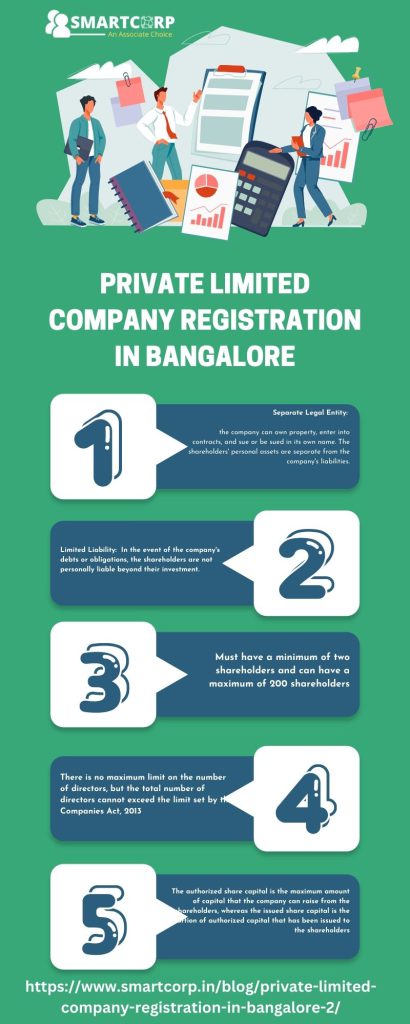
Private limited company registration in Bangalore
In India, a Private Limited Company is a popular form of business organization that combines the advantages of limited liability and flexibility in management. It is governed by the Companies Act, 2013, and provides a separate legal entity distinct from its shareholders. In this blog, I have discussed Private limited company registration in bangalore.
Definition:
A Private Limited Company, often abbreviated as Pvt Ltd or Pvt. Ltd., is a company that has a minimum of two and a maximum of 200 shareholders. It must use the words “Private Limited” at the end of its name to indicate its legal structure.
The liability of the shareholders is limited to the amount they have invested in the company, and their personal assets are protected from the company’s liabilities.
Key Characteristics of a Private Limited Company in India:
Separate Legal Entity:
A Pvt ltd company with Private limited company registration in Bangalore is considered a separate legal entity from its shareholders. It means that the company can own property, enter into contracts, and sue or be sued in its own name. The shareholders’ personal assets are separate from the company’s liabilities.
Limited Liability:
The liability of the shareholders in a Private Limited Company is limited to the extent of their shareholding in the company. In the event of the company’s debts or obligations, the shareholders are not personally liable beyond their investment.
Minimum and Maximum Shareholders:
A Company having Private limited company registration in Bangalore must have a minimum of two shareholders and can have a maximum of 200 shareholders. The shareholders can be individuals or other legal entities, such as other companies or trusts.
Minimum and Maximum Directors:
A Private Limited Company must have a minimum of two directors, and at least one of them should be a resident of India. There is no maximum limit on the number of directors, but the total number of directors cannot exceed the limit set by the Companies Act, 2013.
Share Capital:
A pvt company with Private limited company registration in Bangalore can have both authorized and issued share capital. The authorized share capital is the maximum amount of capital that the company can raise from the shareholders, whereas the issued share capital is the portion of authorized capital that has been issued to the shareholders.
Transferability of Shares:
The shares of a Private Limited Company are generally not freely transferable. The transfer of shares is subject to certain restrictions as specified in the Articles of Association or Shareholders’ Agreement. The consent of the shareholders is usually required for the transfer of shares.
Statutory Compliance:
A Company with Private limited company registration in Bangalore is required to comply with various legal and regulatory requirements, such as maintaining proper books of accounts, conducting annual audits, filing annual financial statements and annual returns with the Registrar of Companies (ROC), and holding regular meetings of shareholders and directors.
Private Limited Companies are widely preferred by entrepreneurs and businesses in India due to their limited liability protection, flexibility in management, access to funding, and credibility in the eyes of customers, suppliers, and financial institutions.
However, it is important to comply with the legal and regulatory requirements and maintain proper corporate governance practices to enjoy the benefits of operating as a pvt ltd company with Private limited company registration in Bangalore. Seeking professional advice from legal and financial experts is advisable to ensure compliance and make informed decisions regarding the formation and management of a Private Limited Company in India.
How can I take profit from Pvt Ltd Company?
As a shareholder and director of a Private Limited Company in India, there are several ways to take profits from the company. The method you choose will depend on various factors such as the company’s financial position, legal requirements, tax implications, and your personal preferences.
Dividends:
Dividends are a common way to distribute profits to shareholders. A dividend is a portion of the company’s profits that is paid to shareholders in proportion to their shareholding. To declare dividends, the company with Private limited company registration in Bangalore must have sufficient profits after accounting for expenses, taxes, and retained earnings.
The declaration and distribution of dividends should comply with the provisions of the Companies Act, 2013, and any specific provisions mentioned in the Articles of Association.
Salary and Bonuses:

If you are an employee of the Private Limited Company, you can receive a salary for your services. The salary should be reasonable and commensurate with your role and responsibilities.
It is subject to deduction of taxes and compliance with applicable labor laws. Additionally, the company with Private limited company registration in Bangalore may consider paying bonuses or performance-based incentives to employees, including directors, based on predetermined criteria.
Director’s Remuneration:
Directors of the Private Limited Company can receive remuneration for their services rendered to the company. The remuneration should be authorized by the company’s Articles of Association or by a resolution passed in a general meeting.
The maximum remuneration payable to directors is subject to certain limits specified in the Companies Act, 2013. The remuneration can include a fixed amount, sitting fees for attending board meetings, and commission based on the company’s profits.
Loans and Advances:
The Pvt ltd Company that has Private limited company registration in Bangalore may provide loans or advances to shareholders or directors. However, this should be done within the legal framework and comply with the provisions of the Companies Act, 2013. Any loans or advances provided should be approved by the board of directors and be in the best interests of the company. Interest may be charged on the loans as per prevailing market rates.
Rent or Lease Payments:
If the Private Limited Company owns property or assets, it can lease or rent them to shareholders or directors. The rent or lease payments should be at fair market value and based on a formal agreement. It is important to ensure that such transactions are conducted at arm’s length and comply with applicable laws and regulations.
Capital Reduction or Redemption:
In certain situations, a Pvt ltd Company with Private limited company registration in Bangalore may choose to reduce its share capital or redeem shares. This can be done by buying back shares from shareholders or cancelling shares.
The reduction or redemption of share capital should be carried out in accordance with the provisions of the Companies Act, 2013, and any applicable rules and regulations.
Sale of Shares:
Shareholders of a Private Limited Company have the option to sell their shares to third parties. If there is a willing buyer, shares can be transferred at a mutually agreed price. The sale of shares allows shareholders to realize profits based on the increase in the value of their shares over time.
It is important to note that the above methods of taking profit from a Private Limited Company with Private limited company registration in Bangalore may have legal and tax implications. It is advisable to consult with professionals, such as accountants, tax advisors, and legal experts, to ensure compliance with applicable laws, regulations, and tax requirements.
They can guide you on the most appropriate method for taking profits from your specific Private Limited Company, considering your objectives and the prevailing legal and regulatory framework. Seeking professional advice is highly recommended to determine the most suitable and compliant approach to profit distribution based on your specific circumstances.
We Smartcorp have a professional team who are very keen in satisfying the compliances for registration.

